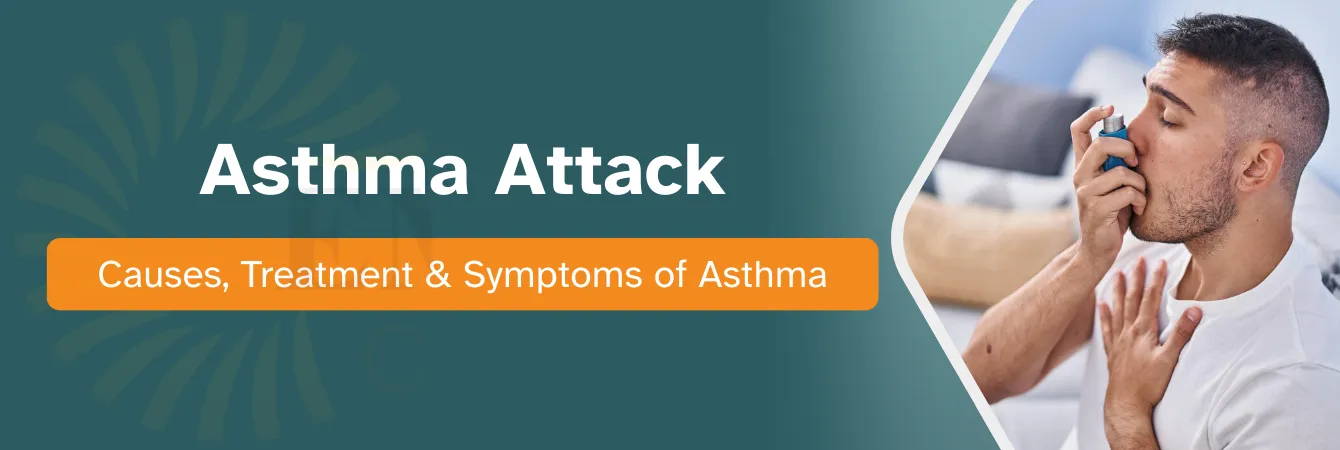Asthma Attack: Causes, Symptoms, Treatment & Prevention
- August 27, 2025
- Abrol Hospital
Asthma is a chronic condition that affects millions of people worldwide, causing breathing difficulties that can range from mild discomfort to life-threatening emergencies. One of the most concerning occurence experienced by asthma patients is an asthma attack. This condition involves a sudden worsening of asthma symptoms, often marked by dyspnea (shortness of breath), wheezing, chest tightness or chest pain, and coughing.
Asthma attacks are not only a challenge for those living with the disease but also a major public health concern. Understanding the causes, symptoms, treatment, and prevention of asthma attacks can help patients and caregivers manage the condition more effectively, improve quality of life, and reduce risks of severe complications.
In this detailed guide, we will cover everything about asthma attacks, including how they differ from COPD (Chronic Obstructive Pulmonary Disease), and provide insights into prevention strategies that can help minimize risks.
What Is an Asthma Attack?
An asthma attack (also called an asthma exacerbation) occurs when the airways in the lungs become inflamed and swollen, the muscles around them tighten, and excess mucus is produced. This combination narrows the airways, making it difficult for air to move in and out of the lungs.
During an attack, the patient may experience:
Dyspnea (shortness of breath)
Wheezing (whistling sound while breathing)
Chest tightness
Coughing that worsens at night or early morning
If untreated, severe asthma attacks can become medical emergencies and even life-threatening.
Difference Between Asthma and COPD (Chronic Obstructive Pulmonary Disease)
Asthma and COPD (Chronic Obstructive Pulmonary Disease) share many symptoms, such as dyspnea, coughing, and wheezing. However, they are different conditions:
Asthma: Usually triggered by allergens, irritants, exercise, or cold air. Symptoms are reversible with treatment.
COPD: A chronic disease that is frequently brought on by long term smoking or exposure to irritants in the lungs. Damage is usually permanent and worsens over time.
Asthma patients may experience sudden flare-ups (asthma attacks), whereas COPD symptoms tend to progress gradually but can also worsen suddenly in acute exacerbations.
Causes of Asthma Attack
Several factors can trigger an asthma attack. These vary from person to person, but common causes include:
1. Allergens: Pollen, dust mites, pet dander, mold spores, and cockroach droppings are common asthma triggers.
Exposure to allergens can cause the immune system to overreact, leading to airway inflammation.
2. Irritants: Smoke (cigarette, wood fire, industrial), strong odors, air pollution, and chemical fumes.
Sudden inhalation of irritants can trigger dyspnea and airway constriction.
3. Respiratory Infections: Viral infections like flu, cold, or bronchitis can inflame airways and worsen asthma symptoms.
One of the most frequent reasons why children get asthma attacks is infections.
4. Physical Activity (Exercise-Induced Asthma): Asthma attacks can be brought on by vigorous exertion, particularly in cold climates. Known as exercise-induced bronchoconstriction (EIB).
5. Weather Conditions: Sudden changes in temperature, high humidity, or cold dry air can provoke attacks.
6. Stress and Strong Emotions: Anxiety, anger, or stress can affect breathing patterns, leading to hyperventilation and worsening symptoms.
7. Medications: Certain drugs like aspirin, NSAIDs, or beta-blockers may trigger asthma in sensitive individuals.
Symptoms of an Asthma Attack
Shortness of Breath (Dyspnea): This is the most prominent symptom of an asthma attack. Patients often feel like they cannot get enough air, leading to panic and discomfort.
Wheezing: A high-pitched whistling sound heard during breathing, especially on exhalation. It indicates narrowed airways and is a classic sign of asthma.
Chest Tightness: Many individuals describe this as a feeling of pressure, heaviness, or squeezing in the chest, chest pain making it hard to breathe deeply.
Coughing: Persistent coughing, particularly at night or early morning, is a common symptom. It may be dry or accompanied by mucus.
Difficulty Sleeping: Nighttime symptoms like coughing and wheezing can disrupt sleep, leading to fatigue and poor daytime functioning.
Treatment Optiions of Asthma Attack
1. Quick-Relief Medications (Rescue Medications)
Short-acting beta-agonists (SABA) like albuterol open airways quickly.
Inhalers or nebulizers provide rapid relief from dyspnea.
2. Long-Term Control Medications
Inhaled Corticosteroids (ICS) reduce airway inflammation.
Long-acting beta-agonists (LABA), combined with steroids, help maintain control.
Leukotriene Modifiers reduce inflammatory response to triggers.
3. Biologic Therapies
New treatments like omalizumab, mepolizumab, and benralizumab target specific immune responses.
Helpful for severe asthma that doesn’t respond to inhalers.
4. Oxygen Therapy
Given during severe asthma attacks to maintain oxygen levels.
5. Hospitalization
In critical cases, intravenous steroids, continuous nebulization, or mechanical ventilation may be required.
Take Control of Your Breathing—Consult Our Pulmonologist Today
Living with asthma or Chronic Obstructive Pulmonary Disease (COPD) can feel like carrying a weight on your chest—every breath a struggle, every day a challenge. But it doesn’t have to be this way. If you’re experiencing persistent coughing, wheezing, shortness of breath, or chest tightness, it’s time to seek expert care. Our expert pulmonologist is here to help you reclaim your breath and your life.
📞 Book Your Appointment Today
Don’t let asthma or COPD control your life. Let our pulmonologist in Gurdaspur help you breathe easier, sleep better, and live fuller.
FAQs (Frequently Asked Questions)
Typical asthma symptoms include:
Shortness of breath
Wheezing
Persistent coughing (especially at night)
Chest tightness
Fatigue during physical activity
During an asthma attack:
Use your rescue inhaler immediately.
Sit upright and try to stay calm.
Avoid triggers like smoke or allergens.
Seek emergency help if symptoms worsen or don’t improve within 15–20 minutes.
An asthma attack involves sudden tightening of airway muscles, inflammation, and excess mucus production. This leads to difficulty breathing, wheezing, coughing, and chest tightness. Oxygen intake drops, which can be dangerous if not treated promptly.
While no drink cures asthma, some beverages may soothe symptoms:
Warm water helps loosen mucus.
Ginger tea has anti-inflammatory properties.
Honey with warm water may ease coughing. Avoid cold drinks or dairy if they worsen symptoms.



